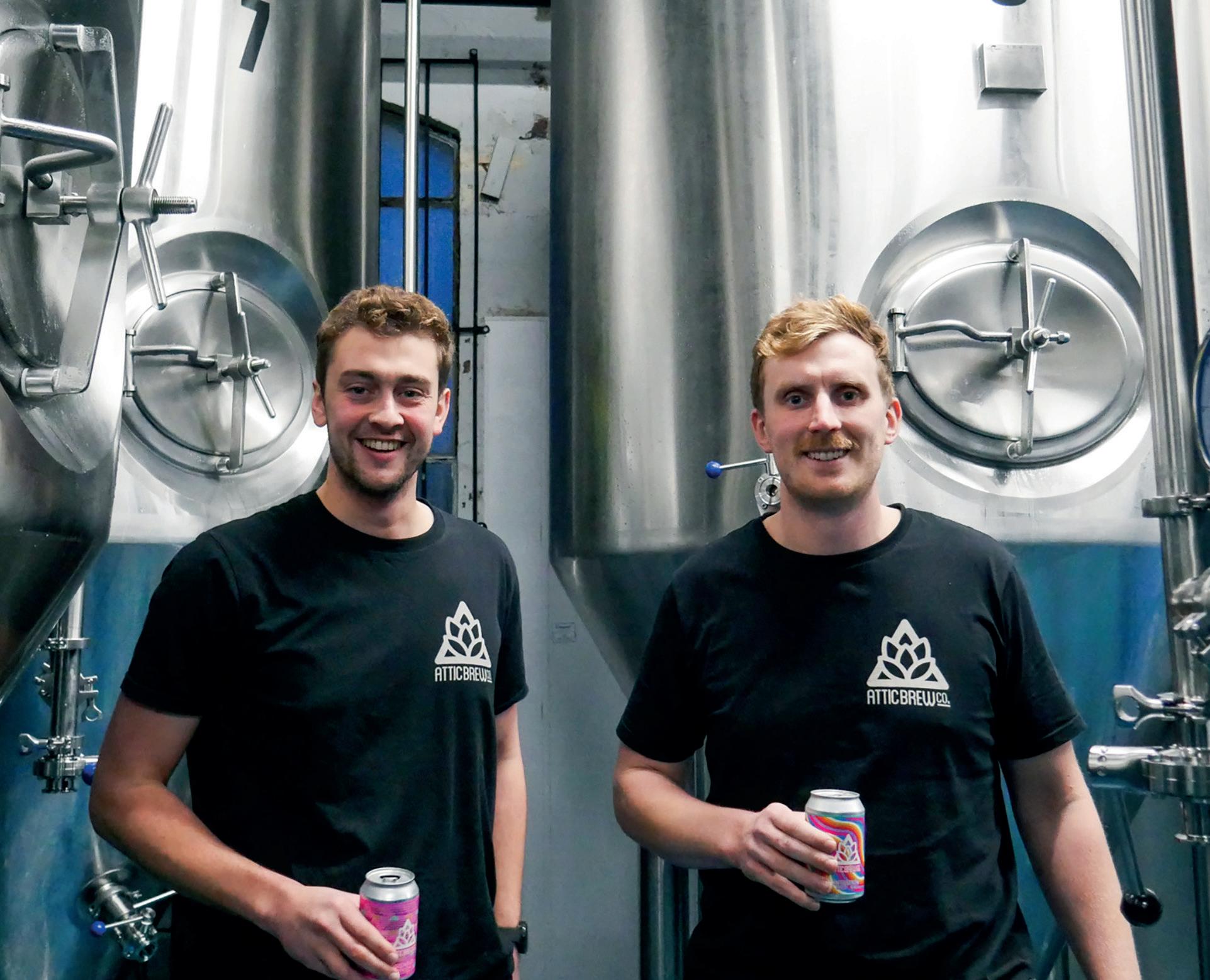
17 minute read
Business Profile We meet Oli Hurlow, half of the partnership duo behind Birmingham brewery Attic
Cash in the Attic
Oli Hurlow and his business partner Sam Back met at University, where they developed their love for beer through Sam’s first foray into homebrewing from a bucket in his bedroom in their shared student house. The venture expanded modestly at first after Sam left Uni and returned to his home city, Birmingham, where his growing brewkit was moved up into his attic – and the name and idea for his future business was born! The pair teamed back up once plans for Attic Brew Co were formalised, and the brewery and taproom launched in 2018 onto an embryonic Birmingham craft beer scene where they were genuine pioneers. Four years later, Attic has not only weathered the storms of the past three years, but achieved rapid expansion and development that they could only have dreamed of back in 2018. Attic is very much the centre of the local craft beer scene, and Oli and Sam have remained true to their ethos of placing their beers at the heart of community gatherings, with the taproom very much at the centre of that social circle. Covid, and the advent of the Attic webshop, have allowed the brewery to expand its horizons to the rest of the city and beyond to a national market, and help spread the word about the beers and the growing craft beer scene in Birmingham. Attic is now on the hunt for further retail sites to add to its taproom, initially in Birmingham but with eventual ambitions to take Attic further afield. Caroline Nodder, SIBA Independent Brewer’s Editor, spoke to Oli in early November to hear more about Attic’s plans for the future and how far the business has come…
Business Basics
Name: Attic Brew Co Founded: November 2018 Location: Birmingham Owners: Oli Hurlow and Sam Back Annual production: 4,000hl (projection for 2022) Brewing team: 6 Total Staff: 14 (full time) Flagship beers: Intuition (4.4% ABV Pale Ale), Birmingham Pilsner (4.5% ABV Lager) & Signals (5.6% ABV IPA) Production split: 77% keg, 20% small pack & 3% cask Key export markets: No export
How did Attic come to be founded and how has the business developed since then?
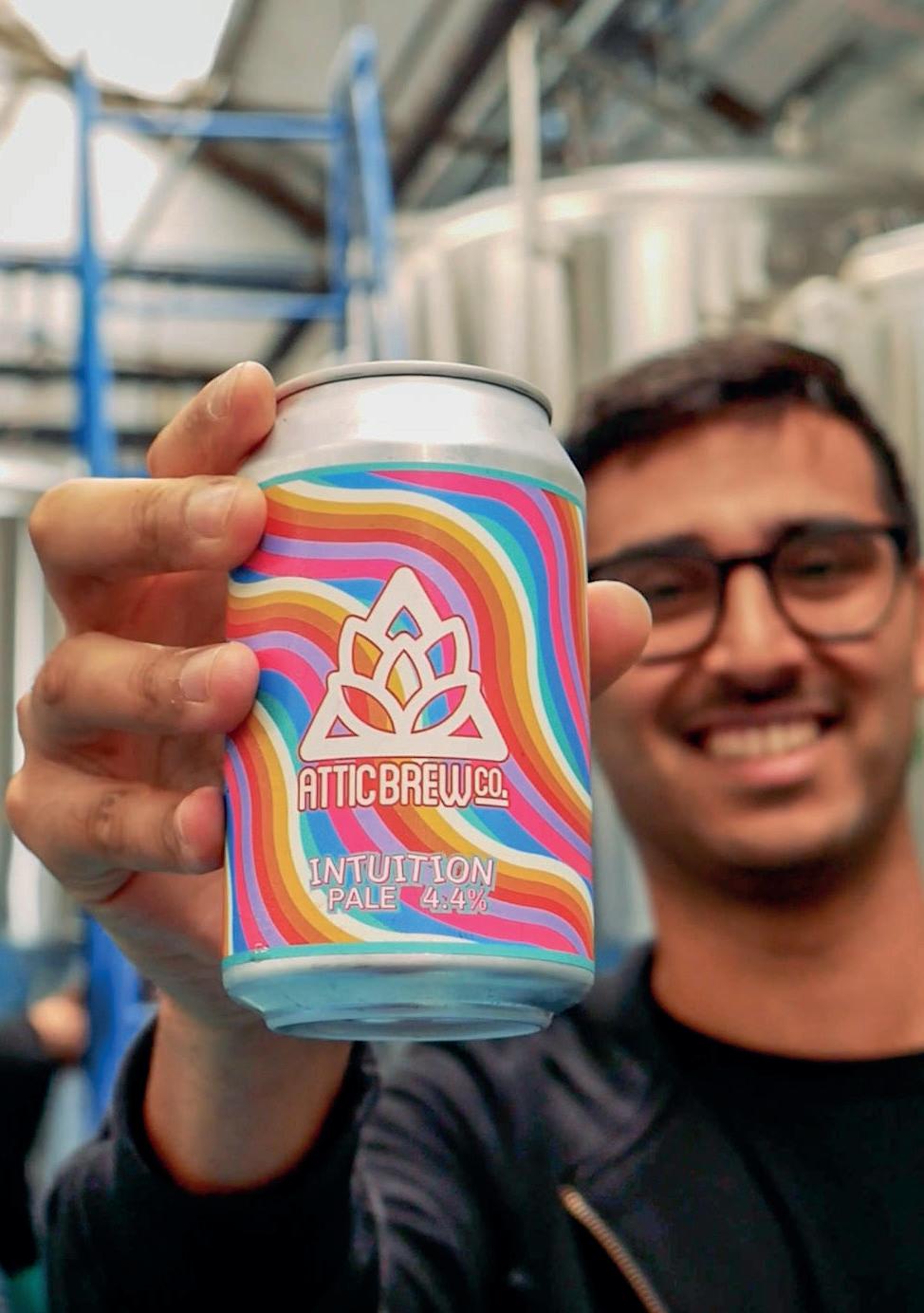
“I think it was quite a similar story to probably a lot of breweries, in that we came from a homebrew background. We went to Uni together, we lived together at Uni, the two of us, and Sam was just starting to get into homebrewing, from a bucket in his bedroom. Some pretty ropey stuff! But it was nice cheap beer to get us through Uni. And then he just carried that on. We went our separate ways, he moved back up to Birmingham, where he's from, and I was down in London, and he carried on homebrewing, and refining it and investing in his own setup in his attic - which is where the name comes from! I've never brewed beer myself, I just got used to drinking his. But he came to me and said, ‘look, I want to start a brewery, I want to make it my job, and I want someone to do it with me. So that's where I came in. I moved up to Birmingham and went to work. We started out really, really small, only about 800 litres a week we were producing and that all very quickly got hoovered up by our taproom. We always had the taproom and it was always busy so we started off being more of a brew pub really, with a tiny brewery that we had scraped together the funds to buy – we didn’t have much investment to start with. But we were able to plough any money that we made back into the brewery and expand. We have now taken on the next door unit and knocked through. So the brewery itself has moved into that new space. But the taproom is still in the same space as when we opened.”
What is the ethos behind the brewery and your beers?
“We were always very ‘taproom first’. And the reason behind that was that, to us, craft beer is great and you get all these different flavours, but at its heart beer is about bringing communities together. It’s about people coming in for a beer, and we wanted to set the taproom up very much like a local pub where people would come and get to know one another and have a chat over a beer. We've always been very focused on the surrounding area, and then moving on from that to Birmingham in general, and we want to serve the people of Birmingham with good beer and we want them to then tell other people about Birmingham via that good beer!”
How would you describe the craft beer scene in Birmingham in 2022 as compared to when you launched?
“It was lagging behind some of the other major cities in the UK. I mean, you look at some of the scenes in London, Bristol, Manchester, Leeds, and they're very vibrant scenes. When we turned up in Birmingham, there was really very little. And that was one of the things that made us confident that this was a good opportunity to pursue in a city with a massive population. It was really under-served with good beer. Setting up here, we didn't have too much in the way of competition at the time. And actually, what we did have in terms of ‘competition’, was really us all building the scene together. And definitely since then the scene has improved hugely. Obviously, I think we have been a part of that. But there's also been some amazing breweries and some great beer coming out of the city. I think it's taken a bit of a different path to a lot of other cities, I don't think there are as many craft beer focused bars, but that's not to say there's not a demand for the beer, I think it just comes through in a different way. But it's growing, and it's a really exciting place to be. Certainly where we are it's such a vibrant beer scene now. It's a full day out to come here. You've got three breweries here, we've got loads of different little bars serving really good beer, food, great bottle shops. It's a really nice little centre for beer within Birmingham.”
What effect has the pandemic had on Attic?
“It's a question I've been asked a few times, and it's a strange answer. Obviously, it was probably one of the worst times, if not the worst time, for the hospitality industry, in living memory. But without it, we would certainly not be the business we are today. It really did force our hand to pivot. We were literally just making enough to sell on site. And that was everything we were doing. Lockdown forced us to can the beer, which meant we could then distribute it a bit further afield, rather than just to our hyper local community. So that started to spread the brand a little bit further in the city, and eventually a bit further again, across the country. When we reopened, we had a lot more demand from pubs because they'd had a chance to try the beer. And the other big thing was that because the government was trying to stimulate a bit of growth, they were unusually generous with the loans that they were willing to provide. So we took advantage of that and we expanded the brewery quite significantly. That is just something we never would have had the opportunity to do. Certainly not without selling our soul a little bit to investors. So in a weird way the pandemic has been amazing for us. This is where we would have liked to be in several years’ time, we just never thought there was any possibility that we'd be able to get where we are now.”
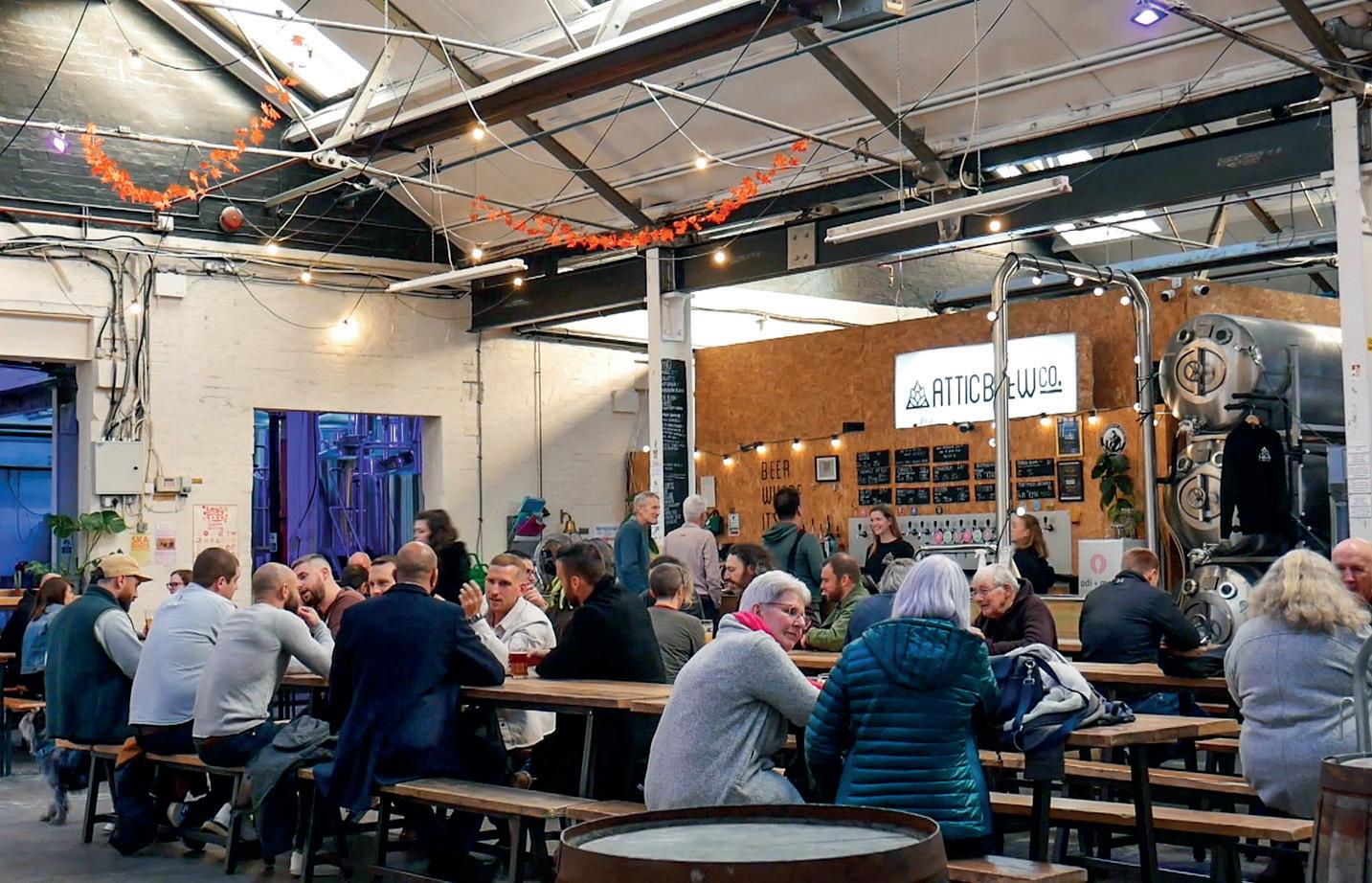
How are you approaching the issue of sustainability?
“It was nice to be able to have this big new expansion, because we were able to keep in mind sustainability when we were doing that. We’ve put a very efficient brewhouse in which recovers a huge amount of heat, so it's really efficient. Relatively speaking, certainly compared to the previous brewery we had, it's really quite minimal on energy consumption, which is brilliant for environmental reasons and also in the current climate for energy bills. We also installed a nitrogen generator, which I think is a really important step, because rather than using CO2 - we still use carbon dioxide to carbonate beer, but we tended to use an enormous amount of CO2 just moving beer around, moving it in and out of tanks. And that CO2 was just going straight into the atmosphere. So we've installed this nitrogen generator that essentially takes atmospheric nitrogen out so we can use that when moving beer around, and then put it back into the atmosphere, and it's no net gain. We are also working with this startup company locally that is looking to develop a process to turn some of our waste products into a sustainable food source - using it to grow meat in a lab. We are a vegan brewery, so that’s a subject quite close to our heart."
We’ve put a very efficient brewhouse in which recovers a huge amount of heat, so it's really efficient. Relatively speaking, certainly compared to the previous brewery we had, it's really quite minimal on energy consumption.

How successful has your online shop been?
“We launched it about a week into the pandemic. We had one of our regulars from the taproom who just dropped us a line and said, ‘look, you're probably gonna need an online shop, I'll give you a hand’, which meant we could get there really quickly. Then over lockdown it was brilliant. And we had a whole load of learning - we were learning to can the beer, we were learning how to process the orders and get them delivered efficiently. It was really busy, and it kept us afloat. Nowadays, we predominantly sell in to the on-trade, so we’re very much a keg focused brewery. But the webshop has started to increase in demand recently, I think partly because of Christmas, and partly because I think we're improving how we do it. I think there was a period of massive excitement about going back out to drink. And I think it's probably starting to even back out again now.”
You have a Code of Conduct very clearly signposted on your website. How have you handled issues around inclusion at Attic?
“We've been quite small brewery for much of the time. So we've always had a feeling for the whole team. But as we've grown, we've felt the need to put things down in writing. I think the truth is that there's still a lot more for us, and as an industry, to do but the fact that we've got the code of conduct published means that we can be held to account. Also it means that it's out there for the public to see and they can know what our expectations are in terms of behaviour, and when they're coming into the taproom they can see what we are expecting of our staff as well.”


‘We've always been interested in the beer, for sure that's a given, but certainly from my point of view, out of the two of us Sam has always been the brewer and I've been a bit more invested in the social side of it. But between us we realised why we liked beer was because it's just great to be able to go out and have a couple of pints with people. And there was a lot of news, and still is, about pubs closing. About losing that third space when you’re working from home, to go and meet people. And we thought, there's obviously a need for this. It’s what we want from our beer anyways, to get people together. We've got quite a big site, so we've got space to do it, and there was no reason not to. And obviously, from a commercial standpoint as well, it's been really helpful, particularly for a new business. Especially for a brand new brewery trying to establish a foothold, particularly in a place like Birmingham, where there was no knowledge at the time of craft beer and the opportunity of craft beer was actually relatively small, because there wasn't much of a market. It really gave us a platform to get people to know about us and be able to try the beer, and then it gave us somewhere to start from. I really credit the taproom with being the reason that we got through Covid, even when the doors were shut, because in the first year that we were opened before Covid hit we became a real part of the community. People knew us, and we knew them, and they really wanted to support us as lockdown happened. And it's still a massively important part of the business. It's still our single biggest trade customer, much bigger than any of our other accounts.”
Tell us more about the type of events you hold at the brewery.
“We have got a series of rotating street food vendors in at the taproom, so we get a different food vendor every weekend, which keeps things nice and new and refreshing. Events wise, we've got a pretty broad range. We have regular craft fairs that we hold. And then we have art shows from local galleries, we put live music on and we've got comedy nights every now and again. Everything we do is free to enter these days, it’s designed to get people in and to get people out and doing something. So we're not looking to make money necessarily off events, just getting people through the door is useful.”
What is the main focus for Attic for 2023 and beyond?
“Similar to with the taproom, we want to be able to interact with people directly and to sell beer to people directly. It's always been a core goal of ours. So with the taproom being one place, we want to open another bar next year. And hopefully, over the next five years, a couple more. We're looking at one in Birmingham for next year. And then probably the surrounding areas we're hoping over the following few years. But in addition to that, we also want to start to get a bit more national recognition. And to see our beer elsewhere, with the goal of telling people that Birmingham has actually got some pretty cool stuff going on. Generally people tend to think of Birmingham as just full of concrete monstrosities, and not having a huge amount going on. And you do need to scratch the surface a bit, I'll admit, but I think that if you've had the chance to drink our beer somewhere and you make it to the taproom, then you have been forced to scratch the surface, and you've made the journey out a little bit outside the city centre, and suddenly you're in the area we're in, and then you can come to the taproom but also go down the road and you’ll find some amazing places to eat and drink. Suddenly you've had this great day out in Birmingham, and you’re starting to change your opinion.”
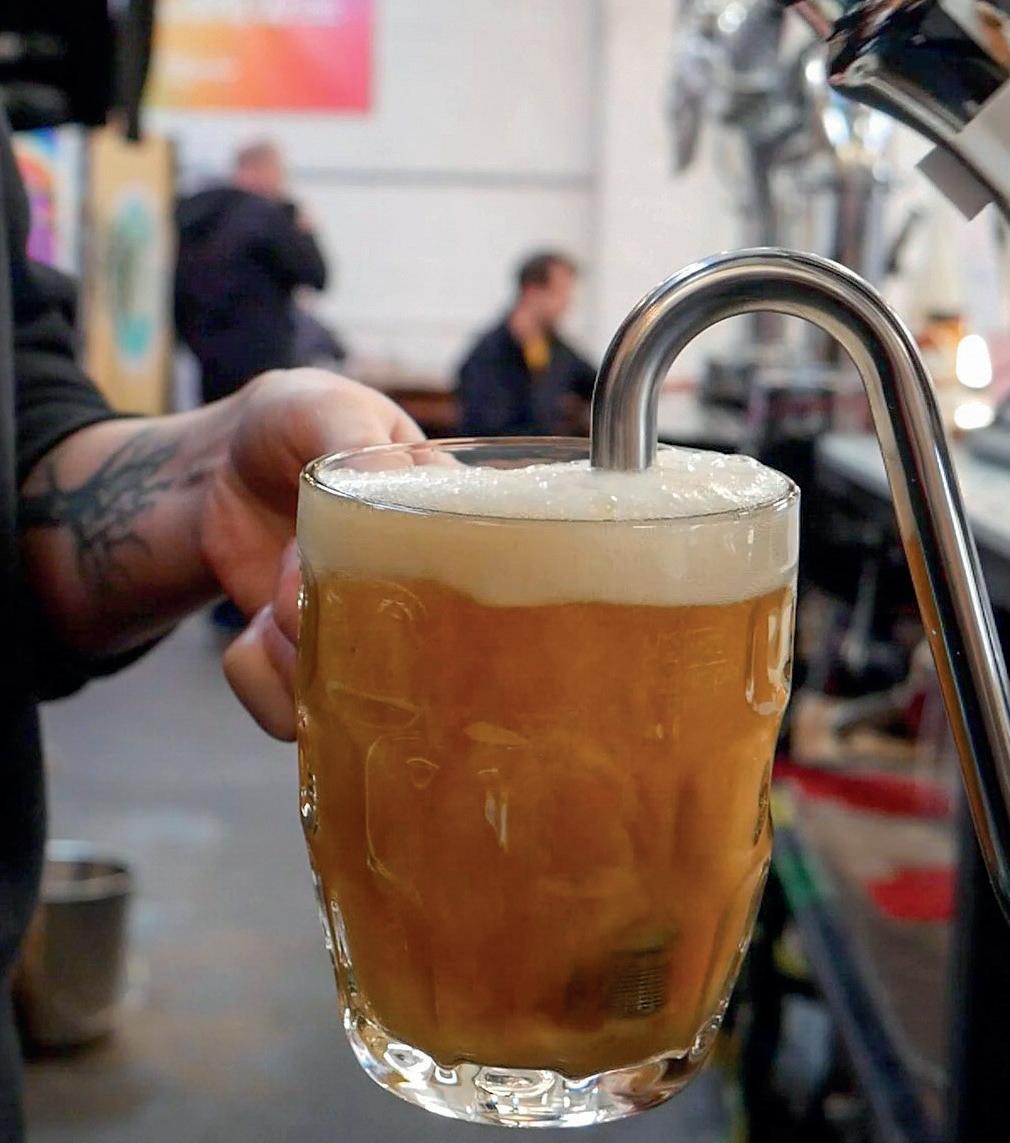
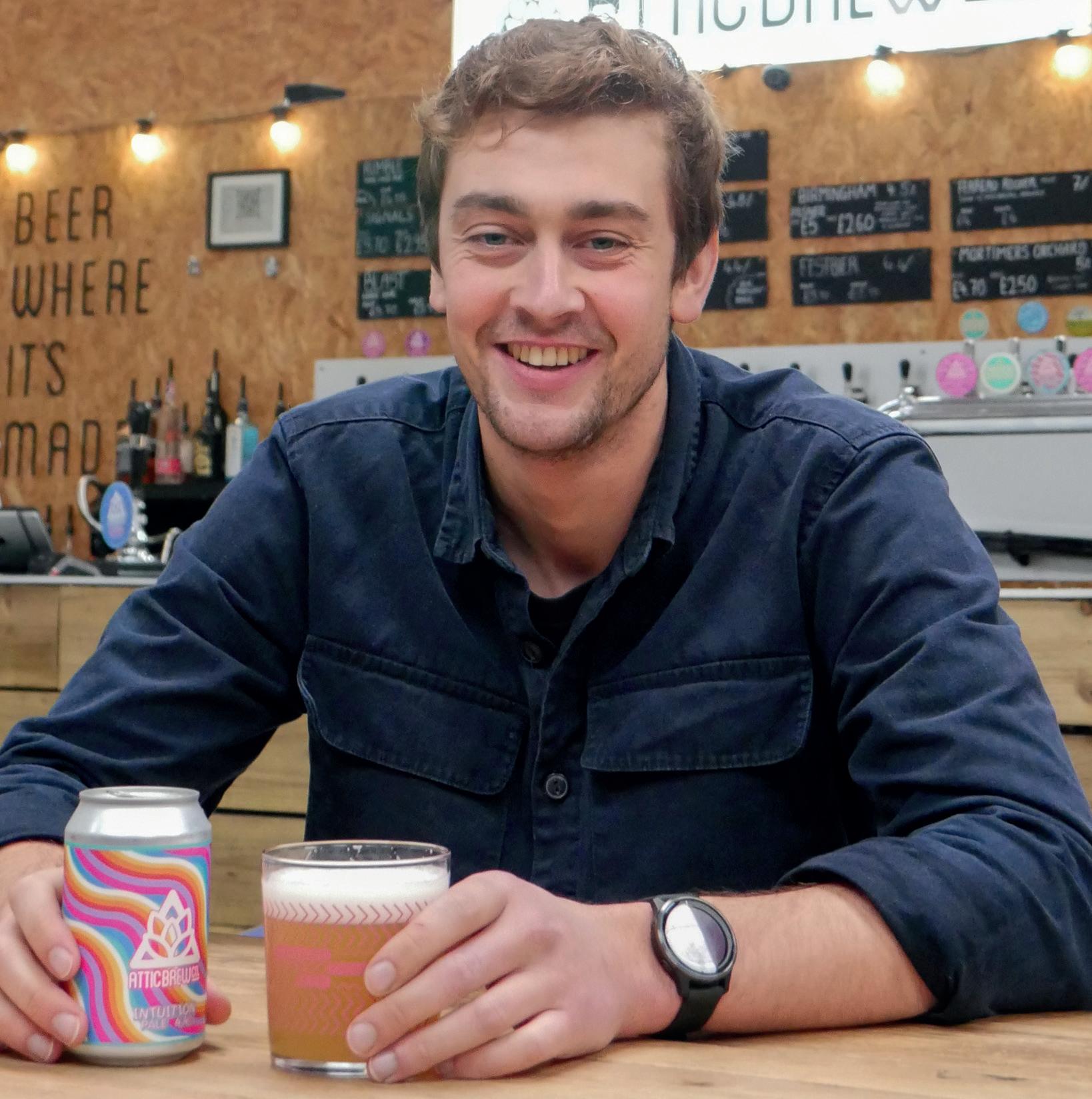
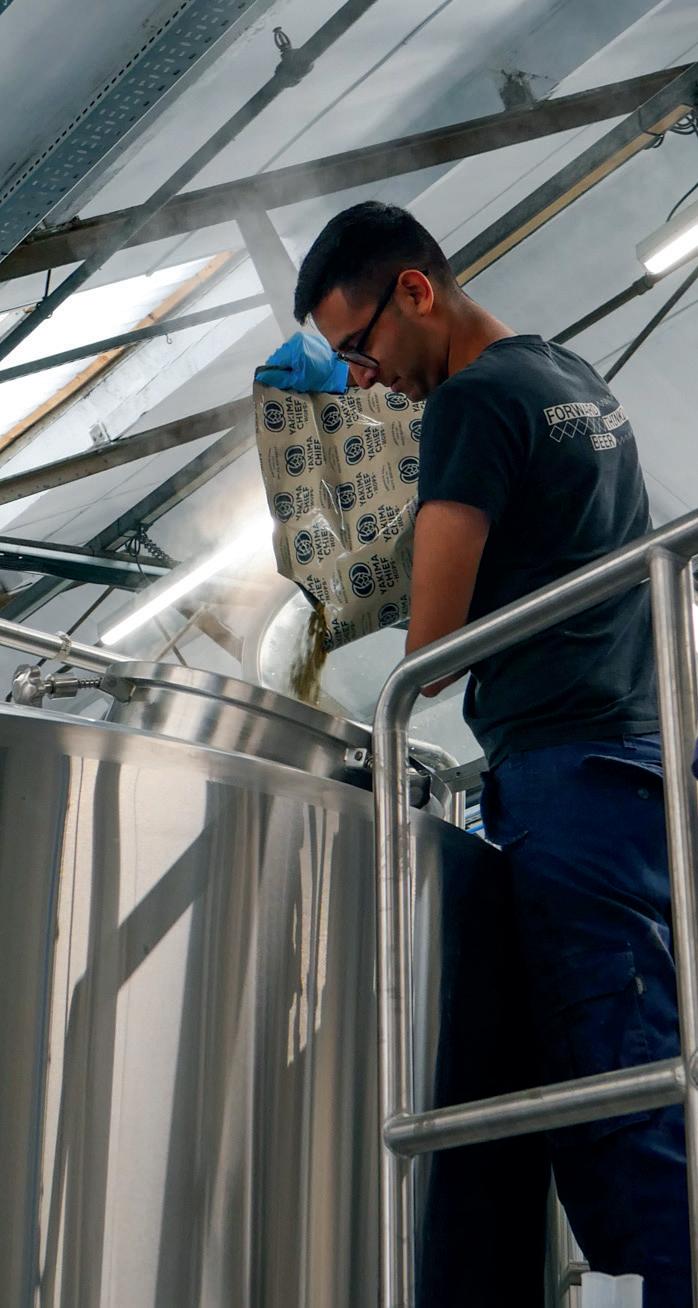
Is national distribution on the cards then?
“It's still a bit of a work in progress, if I'm honest with you. So we're working with several regional distributors, up and down the country. And we’re going to be working with Sainsbury's for the first three months next year as well in 50 stores across the country, which is really exciting in terms of exposure and getting the beer out there. The other really exciting thing that really helps us get the beer in the hands of people up and down with country is that we're working with Cross Country Trains so we’re on all of their services, and they go all the way up to Scotland.”
What main challenges are you facing as a small brewer in the UK market at the moment?
“Route-to-market has always been the stock answer until recently, and I still think that's probably the biggest challenge that we're facing. But I do think that is beginning to change. And it's really nice to see that, you know, craft beer is having a big effect on the beer market as a whole and customers are actively seeking it out. Which then forces retailers to have to find ways to meet that demand, which has opened up opportunities. So I'm willing to be positive about that, but there's obviously real concern about cost of living at the moment, and that's understandably making brewers nervous and it is causing price hikes. And that is quite scary. But I really do think that customers are still going to be happy to pay a little bit extra for quality beer. Particularly because they have had to cut back on bigger expenses, but they still want to feel like they're in control of their finances. They might not be able to afford a big fancy holiday or something like that, but they can go to the pub, and really enjoy that. On energy prices, we're really lucky, in that our landlord controls all of the energy for all sites. So we were in his hands, really, but happily he has security until 2024. So it's gone up a bit, but it's not going up four or five times, like some people have seen. If it had, then we would have really been struggling. I'm really hopeful that it can't last too long, because if it does that is going to be an issue.”
I really do think that customers are still going to be happy to pay a little bit extra for quality beer.
What are you proudest of during your time at Attic?
“I think definitely our most recent expansion. And that's really because it put into perspective how far we've come in such a short time. I mean, we started on a shoestring four years ago with some equipment that was knocked together and is probably older than the two of us put together! And we haven't had any external investment. But we've still been able to install this brewery that is more than 10 times our production capacity. There's not many things that cause you to take a step back and take stock. But having that installed was one of those moments where I have felt most proud of how far we’ve come.”
Who do you most admire in the craft beer sector and why?
“I think there's a couple that I can think of for different reasons. From a production standpoint, I think Vocation have always done an amazing job. You can pick up a beer of theirs from the supermarket, which has great flavour, it holds up really well in that environment, and I just think that that really speaks to the quality of the brewing, as well as good commercial sense to be able to get it at the right price. And I think to be able to do that, keeping the cost down, keeping the quality high, and still getting it out via a channel like a supermarket is really impressive. And then from a branding perspective, I think that Deya really have it nailed. Just everything they do visually and the way they talk about things, it's all just so coherent. And it all gives you a really inherent feeling of what they care about. So, if we can emulate those two then we'll be doing pretty well!”










